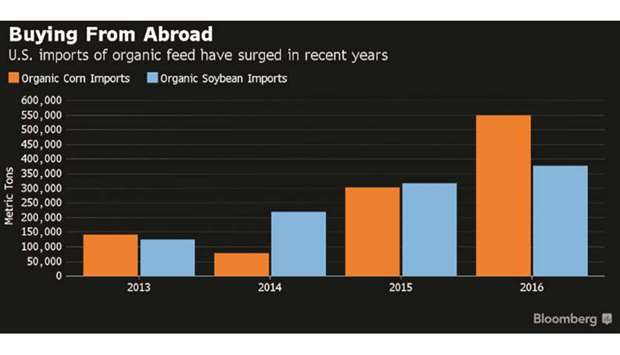The Situation
About three-quarters of grocers in the US sell organic food, including specialty markets, like Sprouts, and mass-market retailers, like Wal-Mart and Target. While that’s only 4% of total food sales, demand in the US and Europe is growing. The trend is driven both by rising interest in locally grown food — two-thirds of US farmers markets have at least one certified organic producer — and fears about food safety. Roughly 48mn Americans every year become sick and 3,000 die from food borne diseases. To be labelled organic, the US Department of Agriculture says food must be grown without synthetic fertilisers and must be free of genetically modified organisms; meat must be raised without antibiotics and growth hormones and the animals must have access to the outdoors. There are similar standards in the European Union and Japan. In China, demand for organic food is skyrocketing after a series of scandals over tainted food has consumers willing to pay double for organic items.
The Background
Until the invention of chemical fertilisers and pesticides, all agriculture was organic. Sulphuric acid was first used to extract phosphate from bones and rock for use as fertiliser in the mid-1800s. Poison gas research in World War I led to bug-killing nerve gases, including sarin and DDT, which was so effective at killing malaria-carrying mosquitoes it won its inventor a Nobel Prize. After Rachel Carson’s book “Silent Spring” documented the dangers of DDT, the chemical was banned for use as a pesticide in the US in 1972. In the 1970s, the first industrial-scale animal farms in the US began popping up, first for egg production, later for pigs and cattle. Yields increased, but so did worries: These animals are often treated with antibiotics and consumption of the meat has led to more drug-resistant infections in humans. Health-food stores began appearing in the 1960s; New Age Natural Foods, opened in San Francisco in 1965. In 1990, after the USDA passed the Organic Foods Production Act to develop national standards, organic products became more common. Mainstream grocery chains started their own lines of organic food, while large foodmakers began snapping up smaller organic startups. Coca-Cola bought juice and bar maker Odwalla in 2001; Stonyfield Farm, an organic dairy producer, became a subsidiary of Danone in 2004; and Hain Celestial Group bought Rudi’s Organic Bakery in 2014.
The Argument
Proponents say that organic produce has more nutrients, including antioxidants and vitamins that may prevent or delay cell damage, than conventionally grown fruits and vegetables. They also argue that eating organic produce and meat reduces diners’ exposure to toxic chemicals, such as pesticides and fertilisers, that may increase the risks of certain types of cancer. A 2016 study found that organic milk and meat have more essential fatty acids and other key nutrients. Eating organic can also help the environment by supporting farms that send less toxic runoff into water and soil. Big supermarket chains like Aldi and Kroger are filling more shelves with organic products, driving down prices for low-income shoppers and biting into the bottom lines of traditional organic and natural-foods stores like Whole Foods. Non-organic makers also see the commercial appeal and have piggybacked on the organic reputation by using labels like “all-natural” or “local,” though these can contain pesticides and chemicals. Just because food is organic doesn’t mean that it won’t make people sick, and fertilising crops with improperly composted manure can result in E. coli contamination. Some say eating organic food doesn’t improve health. In fact, plenty of foods labelled organic aren’t inherently healthy. (Organic gummy bears?) And fears of pesticides may be driving people away from eating enough fruits and vegetables. Nutrition aside, one thing organic foods have going for them is popular opinion — 41% of Americans say organic tastes better than non-organic.

